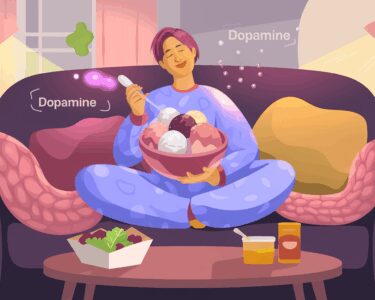The “bed rotting anti-diet moment” trend marks Gen Z’s rebellion against hustle culture and restrictive diets, gathering over 8 billion TikTok views by late 2023. This movement blends purposeful rest with intuitive eating, creating a space where individuals can focus on mental health while rejecting productivity pressures and enjoying food without shame.
Key Takeaways
- The trend serves as a direct response to unprecedented stress levels, particularly among younger generations seeking relief from constant productivity demands.
- Bed rotting activities include guilt-free binge-watching, snacking, working, napping, and content creation—all from the comfort of one’s bed.
- The movement aligns with intuitive eating principles, with research showing this approach leads to better psychological health compared to restrictive diets.
- While offering mental reset benefits, health experts warn about risks of extended inactivity including physical effects and potential worsening of mental health conditions.
- The trend represents a broader cultural shift that transforms perceived “laziness” into a deliberate form of self-care and resistance against hustle culture.
I’ve noticed this movement gaining serious momentum as young people push back against the relentless pressure to stay productive and maintain strict eating habits. They’ve created a genuine sanctuary in their beds—a place to decompress without judgment while snacking on whatever feels right.
Flipping Conventional Wellness on Its Head
What makes this trend particularly interesting is how it flips conventional wellness advice on its head. Instead of rising at 5 AM for a workout or following complex meal plans, followers embrace rest as a legitimate health strategy. They recognize that mental wellbeing sometimes requires disconnecting from constant achievement pressure.
The Anti-Diet Philosophy
The anti-diet component specifically challenges decades of restrictive eating culture. By listening to hunger cues rather than external rules, participants report feeling more at peace with their bodies and food choices. Research backs this approach, showing improved psychological outcomes compared to traditional dieting methods.
Risks and Considerations
Though the benefits can be significant, I should note the potential downsides of extended bed stays. Too much isolation and physical inactivity might amplify depression symptoms for some people. Finding balance remains essential, even within this counterculture movement.
A Silent Rebellion in Comfort
This trend speaks to something deeper than just being lazy—it represents a calculated response to burnout culture. Young people have found a way to reject constant hustle while creating a genuine form of resistance wrapped in blankets and comfort food.
Why Gen Z is Taking “Bed Rotting” Breaks from Hustle Culture
Understanding the Bed Rotting Anti Diet Moment Trend
The bed rotting anti diet moment has captured TikTok by storm, racking up over 8 billion views by late 2023. This trend isn’t just about being lazy – it’s a powerful statement against the constant pressure to be productive. When you’re having your own bed rotting anti diet moment, you’re actively choosing to prioritize rest over society’s expectations.
This trend goes hand-in-hand with other self-care movements, like embracing simple comfort meals and rejecting traditional productivity standards. It’s about spending non-essential waking hours in bed, whether you’re sleeping, scrolling, watching content, or snacking without guilt.
The Rise of Intentional Rest Culture
According to the APA’s 2023 Stress in America survey, younger generations are experiencing unprecedented stress levels. That’s why many are turning to bed rotting as a coping mechanism. This isn’t your typical medical bed rest – it’s a conscious choice to take a break from the daily grind.
During a bed rotting anti diet moment, you might find yourself:
- Binge-watching your favorite shows without feeling guilty
- Enjoying snacks while scrolling through social media
- Working on your laptop from the comfort of your bed
- Taking unplanned naps throughout the day
- Creating content or catching up on trending food routines
This movement has transformed from a simple act of rest into a broader statement about mental health and work-life balance. It’s fascinating how Gen Z has turned what could be seen as unproductive behavior into a powerful form of self-care and resistance against hustle culture.
The bed rotting trend isn’t just about physical rest – it’s a mental reset button that helps combat burnout. By embracing these moments of intentional rest, many are finding better ways to manage their stress and protect their well-being in an increasingly demanding world.
Finding Food Freedom Through Comfort and Rest
The Rise of the Bed Rotting Anti Diet Moment
I’ve noticed a powerful shift in how people approach food and rest. The bed rotting anti diet moment represents a bold rejection of restrictive eating rules, combining cozy relaxation with intuitive food choices. This movement pairs perfectly with unrestricted eating habits, where comfort foods, snacks, and even simple comfort meals take center stage without guilt.
Research from the Journal of the Academy of Nutrition and Dietetics backs this approach, showing that intuitive eating leads to better psychological health. It’s fascinating to see how this bed rotting anti diet moment naturally aligns with listening to our bodies’ needs.
Breaking Free from Diet Culture
The statistics are clear – 95% of diets fail in the long term. That’s why more people are embracing their bed rotting anti diet moment as a form of self-care. Here’s what makes this approach different:
- Freedom to eat without time restrictions
- Permission to enjoy all types of food
- No guilt around comfort snacking
- Listening to genuine hunger signals
- Honoring cravings without judgment
I’ve seen how this combination of physical comfort and food freedom creates a unique space for healing. By rejecting diet culture’s strict rules, people are finding peace with food while wrapped in their favorite blankets. The bed rotting anti diet moment isn’t just about eating in bed – it’s a statement against the pressure to always be productive, always be restricting, and always be on a diet.
The beauty of this approach lies in its simplicity. Instead of complex meal plans or strict eating windows, it encourages you to tune into your body’s natural signals. Whether that means enjoying takeout while binge-watching shows or savoring your favorite snacks during a midday rest, it’s all valid and valuable for your relationship with food.
What Health Experts Say About Extended Rest Periods During a Bed Rotting Anti Diet Moment
The Science Behind Rest and Recovery in Bed Rotting Anti Diet Moment
While I understand the appeal of extended rest periods, it’s crucial to know what medical experts say about this trending behavior. The CDC has set clear guidelines — adults need 7–9 hours of sleep per night for optimal health. Spending excessive time in bed, like during a sad girl dinner phase, can throw off your body’s natural sleep-wake cycle.
Physical inactivity isn’t just about feeling sluggish — the World Health Organization has linked it directly to increased risks of chronic diseases. But here’s the thing: there’s a fine line between taking needed rest and falling into potentially unhealthy patterns.
Professional Perspectives on Bed Rotting Anti Diet Moment
Mental health professionals have pointed out key differences between healthy rest and potential signs of depression. I’ve found that while practicing intuitive eating and enjoying comfort snacks can be part of self-care, registered dietitians stress the importance of maintaining gentle nutrition principles.
Here are the risk factors health experts warn about during extended bed rotting periods:
- Physical effects like muscle weakness and metabolic changes
- Increased social isolation and withdrawal
- Disrupted eating and sleeping patterns
- Potential worsening of existing mental health conditions
It’s worth noting that while a bed rotting anti diet moment might feel comforting short-term, mental health professionals suggest addressing any underlying burnout or emotional struggles directly. They recommend seeking professional help if you notice:
- Difficulty maintaining daily responsibilities
- Strained personal relationships
- Loss of interest in previously enjoyed activities
- Extended periods of low energy or motivation
Remember, while rest is vital, finding balance between recovery and activity supports better overall health outcomes. Mental health professionals emphasize that temporary comfort shouldn’t replace proper support when needed.
Lying in bed all day binge-watching shows and skipping structured meals can feel surprisingly liberating, a reaction some are embracing as part of this growing trend toward slow self-care practices.
Sources:
American Psychological Association – Stress in America Survey 2023
Centers for Disease Control and Prevention – Sleep Guidelines
World Health Organization – Physical Activity Guidelines
Journal of the Academy of Nutrition and Dietetics
National Institute of Mental Health Statistics
Clinical Psychology Review








